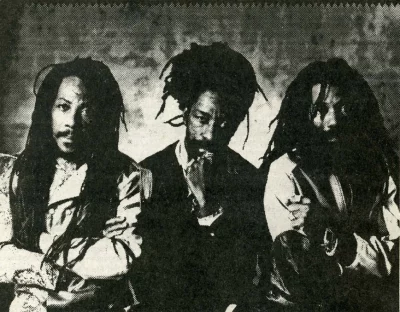
A History of Black Uhuru: August 1993
Archived
Uhuru is the Swahili word for freedom. It is also one of the words that Derrick “Duckie” Simpson chose for the name of his band, Black Uhuru. Formed in 1972, Black Uhuru is still a driving fare in today’s reggae music scene. Things haven’t always been easy, however. The group has survived through seven lineup changes in 20 years. Despite these troubles, they have enjoyed much success and are regarded as one of the most popular reggae bands in the world.

In the beginning, Duckie teamed up with Garth Dennis and Don Carlos to form the first manifestation of Black Uhuru. But the lineup proved to be short lived. After mixing a single titled ‘Folk Song’ for the Dynamic record label both Dennis and Carlos left to pursue individual careers. Garth went on to become a member of the Wailing Souls, and Carlos went on to a successful solo career.
Duckie recruited Errol Nelson and Michael Rose to form the second lineup of Black Uhuru. Duckie, Nelson, and Rose recorded an album together titled Love Crisis for Prince Jammy. Love Crisis (later released by Greensleeves Records under the title Black Sounds of Freedom) was also released in England, but failed to achieve the success that was expected, which caused Nelson to leave the group.
Duckie and Rose decided to include a female voice as a complement to their harmonies. They discovered Sandra “Puma” Jones, an American from South Carolina, who had briefly sung with Ras Michael and the Sons of Negus entourage. Soon after, they approached Sly Dunbar and Robbie Shakespeare to be their rhythm section and producers. This proved to be the most well-known line up which produced their best known albums. Under Sly and Robbie’s production, several singles, including “Guess Who’s Coming to Dinner’ and ‘Shine Eyes Gal”, were released. These songs were compiled together to create the album Showcase (also called simply Black Uhuru). This album received enough success that they were signed on with Island Records. During this time they released the following albums Sinsemilla, Red (nominated 23rd-best album of the ‘80s by Rolling Stone), Chill Out, The Dub Factor, Tear It Up Live, Anthem, and Reggae Greats. “The Youth of Eglington,” “Sponji Reggae,” “What is Life,” and “Solidarity” are some of the hits that came forth during this time. Uhuru’s popularity grew immensely during these years throughout the United States, Canada and Great Britain.
Shortly after their contract with Island Records ended, Rose left the group to pursue the solo career. Duckie and Puma were left with the task of finding a new singer to lead the group. Delory “Junior” Reid was recruited to bring about Uhuru four. With Reid taking most of the lead vocals, Black Uhuru released more impressive material on RAS Records. Their first album together was titled Brutal and featured the monster hit “Great Train Robbery.” Brutal was the last album that Puma was featured on. She left the group in 1986 due to health reasons and was replaced by a Jamaican singer, Janet “Olafunke” Reid. This lineup recorded the Positive album in 1987. There was also a dub album issued by RAS Records in a limited pressing titled Positive Dub (currently available on ROD Records). After this album, Reid decided to pursue a solo career and the band broke up.
Black Uhuru reformed in 1991 with the original lineup of Duckie, Dennis and Carlos. Having come full circle, Black Uhuru continued to produce cutting-edge reggae music. The first album to feature the reunited lineup was called Now, on Mesa Records. The band also released a dub version of this album. Iron Storm was the second album released by the current lineup. “Trouble” and “Tip of the Iceberg” featuring rapper Ice-T are two of the bits off this album. Mesa released a dub version of this album which features many non-typical dubs that include a lot of vocals. Mystical Truth is the latest album released by the trio. “One Love” and “Living in the City” are two of the better tracks. Black Uhuru continues to put out reggae that is fresh and on the cutting edge. They are one of the bands that set the standard for the rest to follow. They will surely remain on the scene for years to come.
Read more from the SLUG Archives:
June Cover Story: N.S.C.
Theatre: Thanatos and Jesus Mania